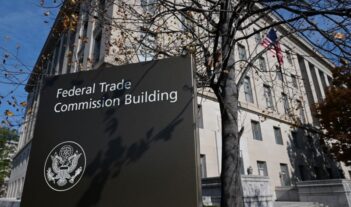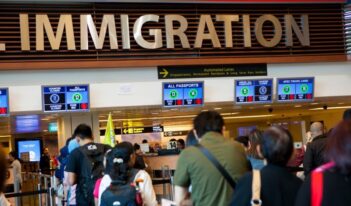
The Supreme Court permits President Trump’s firing of FTC Commissioner, withholding of foreign aid, and more…
IN THE NEWS
- The U.S. Supreme Court lifted a lower court order barring Immigration and Customs Enforcement agents from stopping people in Los Angeles on the basis of factors such as race or language without “reasonable suspicion” that they are in the country unlawfully. The Court offered no majority opinion to support its 6-3 decision. In a concurring opinion, Justice Brett M. Kavanaugh reasoned that law enforcement officials had reasonable suspicion because Los Angeles contains a large number of undocumented immigrants who seek work in particular locations. In dissent, Justice Sonia Sotomayor argued that the majority’s decision enables the government to “seize anyone who looks Latino, speaks Spanish, and appears to work a low-wage job.”
- The Supreme Court temporarily stayed a lower court order prohibiting President Donald J. Trump’s removal of a Federal Trade Commission appointee without cause, as required by statute. Chief Justice John G. Roberts, Jr. granted the Trump Administration emergency relief, allowing the removal to go forward while giving the Court more time to consider the President’s formal request. The Court’s decision follows its ruling earlier this year that allowed the President to remove members of the Consumer Product Safety Commission, another independent regulatory agency.
- The Supreme Court allowed the Trump Administration to temporarily withhold over $4 billion of congressionally authorized foreign aid funding. Under the Impoundment Control Act, the President can request that Congress rescind previously authorized funding, freezing it for 45 days while Congress considers the request. A federal trial court, however, recently rejected the Administration’s attempted “pocket rescission”—a request made less than 45 days from the funding’s expiry so that it will lapse regardless of Congress. The Supreme Court stayed that lower court order but asked the plaintiff, the nonprofit AIDS Vaccine Advocacy Coalition, to respond before the Court issues a final ruling.
- A federal judge temporarily blocked President Trump’s firing of Federal Reserve board member Lisa Cook. Judge Jia M. Cobb of the U.S. District Court for the District of Columbia held that the removal of Cook on the basis of mortgage fraud allegedly committed before her Senate confirmation violated federal law that only permits “for cause” removal. Judge Cobb reasoned that only conduct on the job was grounds for removal and ordered that Cook be immediately reinstated to her position. The Trump Administration appealed the decision.
- The Supreme Court declined to lift a lower court injunction blocking a South Carolina law that penalizes schools that allow transgender students to use bathrooms matching their gender identity, leaving a lower court’s block in place. The decision allows a transgender student in Berkeley County to keep using their preferred restroom while the lawsuit proceeds. Though the Court did not rule on the merits, Justices Clarence Thomas, Samuel Anthony Alito, Jr., and Neil M. Gorsuch dissented, stating they would grant the application.
- New York Attorney General Letitia James intervened in a Texas lawsuit to defend a New York “shield law” that prohibits state officials from cooperating with out-of-state legal actions against New York abortion providers. Texas Attorney General Ken Paxton previously sued a New York physician for prescribing abortion medication to a Texas woman via telemedicine and then sued the New York county clerk who, citing the shield law, refused to enforce the Texas court judgment against the physician. The New York Attorney General’s office announced that the attorney general will file arguments before September 19.
- The Supreme Court fast-tracked a case challenging President Trump’s use of emergency powers to impose sweeping global tariffs, hearing arguments in November. Lower courts ruled the tariffs unlawful, saying the President overstepped the authority granted to him by the International Emergency Economic Powers Act, which authorizes the president to regulate certain economic activity after declaring a national emergency. The Administration claimed the duties are essential to trade negotiations and economic stability, while critics argue they violate the Constitution’s separation of powers.
- President Trump ordered Secretary of Health and Human Services Robert F. Kennedy Jr. and Commissioner of Food and Drugs Dr. Martin A. Makary to crack down on direct-to-consumer pharmaceutical advertising, with the U.S. Food and Drug Administration (FDA) issuing thousands of warning letters to pharmaceutical companies and promising new regulations to close loopholes in drug disclosure rules. The order targets misleading ads, especially on social media, and aims to curb overprescription, particularly among children.
WHAT WE’RE READING THIS WEEK
- A recent U.S. Government Accountability Office (GAO) report examined the effectiveness of the Federal Transit Administration (FTA) in providing grants to improve the accessibility of public transit in rural and tribal areas. GAO found that funding constraints, such as onerous reporting requirements, and driver staffing shortages posed the largest challenges to providing and supporting accessible transit services. GAO highlighted FTA’s role in connecting communities with federal grant funds and removing barriers to transit access, but noted FTA’s lack of procedures to assess the success of its objectives. GAO recommended that FTA establish a formal process to evaluate the effectiveness of its efforts to increase transit accessibility.
- In a National Bureau of Economic Research working paper, Neil Mehrotra and Michael E. Waugh, economists at the Federal Reserve Bank of Minneapolis, argued that tariffs raise the relative price of investment goods, depressing firms’ demand for capital and forcing interest rates lower in the short term as households maintain high savings. Using a model of the United States, European Union, and China, they found that a 15 percent U.S. tariff could cut the U.S. GDP by about 1 percent and lower interest rates by 0.3 percentage points, while a full trade war would roughly double those losses. Over time, both savings and investment adjusted so that the long-term interest rate does not change much. Still, the authors warned that tariffs act like a drag on productivity, leaving the global economy weaker and making it harder for central banks to keep growth and inflation on track.
- In a National Bureau of Economic Research working paper, Caitlin Myers, the John G. McCullough Professor of Economics at Middlebury College, and Daniel Dench and Mayra Pineda-Torres, assistant professors of economics at the Georgia Institute of Technology, examined how the average distance traveled for an abortion mediates the impact of abortion bans on birthrate. Abortion bans increased births even in counties where the addition of a ban did not affect the travel distance required for an abortion, but the impact of bans nearly tripled in counties where, after a ban, the nearest abortion clinic moved from 50 miles to 300 miles away. The distance effect persisted despite increases in shield laws and telemedicine abortion services, potentially because users of telemedicine are primarily women who could have otherwise traveled, while the effect was magnified among Black, Hispanic and less educated women, who the authors theorized may face greater financial barriers to travel.
EDITOR’S CHOICE
- In an essay in The Regulatory Review, Laura Dolbow, an associate professor of law at the University of Colorado Boulder, discussed how, although the Supreme Court rejected challenges to the FDA’s approval of the abortion pill Mifepristone in FDA v. Alliance for Hippocratic Medicine, other legal avenues for restricting abortion remain. Dolbow analyzed the Court’s opinion, which held that the plaintiffs lacked standing to sue based on their mere disagreement with FDA’s decision but did not rule out lawsuits by other plaintiffs, such as states claiming economic harm due to the drain on state Medicaid funds from treating Mifepristone complications. States have also enacted restrictive statewide bans, subject to ongoing constitutional challenges. Dolbow highlighted the Court’s broad language affirming federal conscience protections and emphasized that the battle over Mifepristone access is not over.



